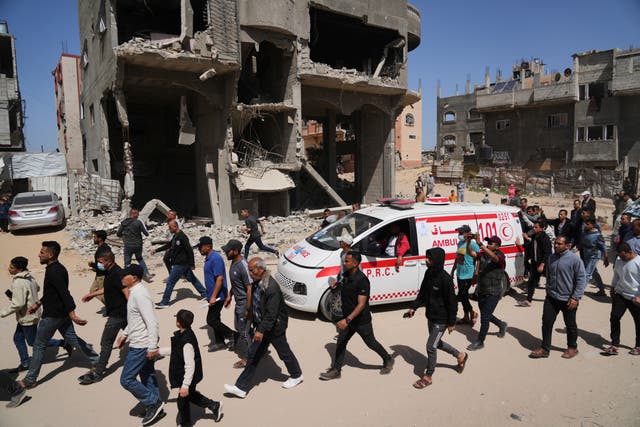Israeli troops killed 15 Palestinian medics and buried them in mass grave – UN
The dead included eight Red Crescent workers, six members of Gaza’s Civil Defence emergency unit and an employee from UNRWA.

Palestinians have held funerals for 15 medics and emergency personnel killed by Israeli troops in southern Gaza after their bodies and mangled ambulances were found buried in an impromptu mass grave.
The Palestinian Red Crescent said the workers and their vehicles were clearly marked as medical and humanitarian personnel and accused Israeli troops of killing them “in cold blood”.
The dead included eight Red Crescent workers, six members of Gaza’s Civil Defence emergency unit and an employee from UNRWA, the UN’s agency for Palestinians.
The International Red Cross/Red Crescent said it was the deadliest attack on its personnel in eight years.
Since the war in Gaza began 18 months ago, Israel has killed more than 100 Civil Defence workers and more than 1,000 health workers, according to the UN.
The emergency teams had been missing since March 23 when they went at around noon to retrieve casualties after Israeli forces launched an offensive into the Tel al-Sultan district of the southern city of Rafah.
The military had called for an evacuation of the area earlier that day, saying Hamas militants were operating there. Alerts from the Civil Defence at the time said displaced Palestinians sheltering in the area had been hit and a team that went to rescue them was “surrounded by Israeli troops”.
“The available information indicates that the first team was killed by Israeli forces on 23 March,” the UN said in a statement.
Further emergency teams that went to rescue the first unit were “struck one after another over several hours”, it added. All the teams went out during daylight hours, according to the Civil Defence.
The Israeli military said on Sunday that on March 23, troops opened fire on vehicles that were “advancing suspiciously” towards them without emergency signals.

It said “an initial assessment” determined that the troops killed a Hamas operative named Mohammed Amin Shobaki and eight other militants. Israel has struck ambulances and other emergency vehicles in the past, accusing Hamas militants of using them for transportation.
However, none of the dead staff members from the Red Crescent and Civil Defence had that name, and no other bodies were reported at the site, raising questions over the military’s suggestion that alleged militants were among the rescue workers.
After a ceasefire that lasted roughly two months, Israel relaunched its military campaign in Gaza on March 18. Since then, bombardment and new ground assaults have killed more than 1,000 Palestinians, according to Gaza’s Health Ministry.
The ministry’s count does not distinguish between militants and civilians, but it says over half those killed are women and children.
Aid workers say ambulance teams and humanitarian staff have come under fire in the renewed assault. A worker with the charity World Central Kitchen was killed on Friday by an Israeli strike that hit next to a kitchen distributing free meals.
A March 19 Israeli tank strike on a UN compound killed a staff member, the UN said, though Israel denies being behind the blast.
For days, Israeli forces would not allow access to the site where the emergency teams disappeared, the UN said.
On Wednesday, a UN convoy tried to reach the site but encountered Israeli troops opening fire on people.
The convoy saw a woman who had been shot lying in the road. The dashboard video shows staff talking about retrieving her, then two people are seen walking across the road. Gunfire rings out and they flee. One stumbles, apparently wounded, before he is shot and falls on to his face to the ground. The UN said the team retrieved the body of the woman and left.
On Sunday, the UN said teams reached the site after the Israeli military informed it where it had buried the bodies, in a barren area on the edges of Tel al-Sultan.
Footage released by the UNshows workers from PRCS and Civil Defence, wearing masks and bright orange vests, digging through hills of dirt that appeared to have been piled up by Israeli bulldozers.
The footage shows them digging out multiple bodies wearing orange emergency vests. Some of the bodies are found piled on top of each other.
At one point, they pull out a body in a Civil Defence vest out of the dirt, and it is revealed to be a torso with no legs. Several ambulances and a UN vehicle, all heavily damaged or torn apart, are also buried in the dirt.
“Their bodies were gathered and buried in this mass grave,” said Jonathan Whittall, with the UN humanitarian office OCHA, speaking at the site in the video. “We’re digging them out in their uniforms, with their gloves on. They were here to save lives.”
“It’s absolute horror what has happened here.”
A giant crowd gathered on Monday outside the morgue of Nasser Hospital in the southern city of Khan Younis as the bodies of the eight PRCS workers were brought out for funerals.
The bodies were laid out on stretchers wrapped in white cloth with the Red Crescent logo on it and their photos, as family and others held funeral prayers over them.
“They were killed in cold blood by the Israeli occupation, despite the clear nature of their humanitarian mission,” said Raed al-Nimis, the Red Crescent spokesman in Gaza.
Israeli troops have killed at least 30 Red Crescent medics over the course of the war.
The head of the International Federation of Red Cross and Red Crescent Societies, Jagan Chapagain, said the staff killed last week “wore emblems that should have protected them; their ambulances were clearly marked”.
“All humanitarians must be protected,” he said.





